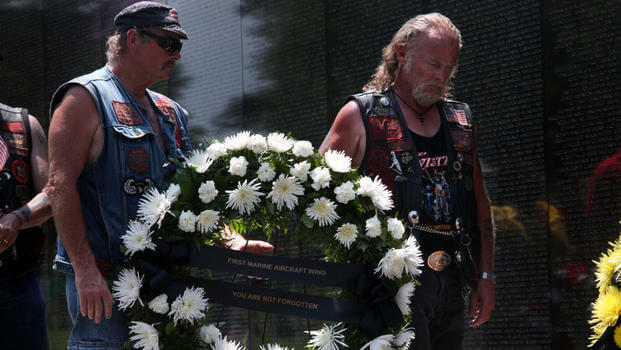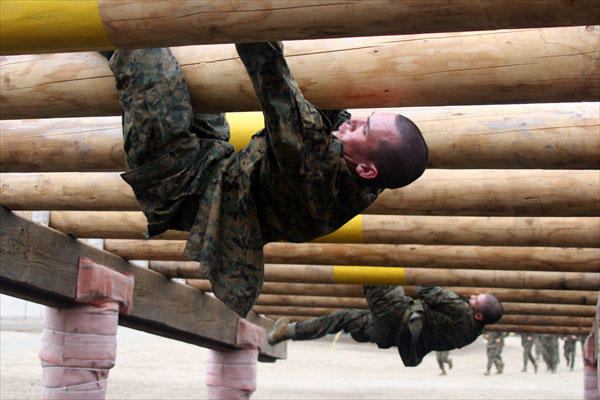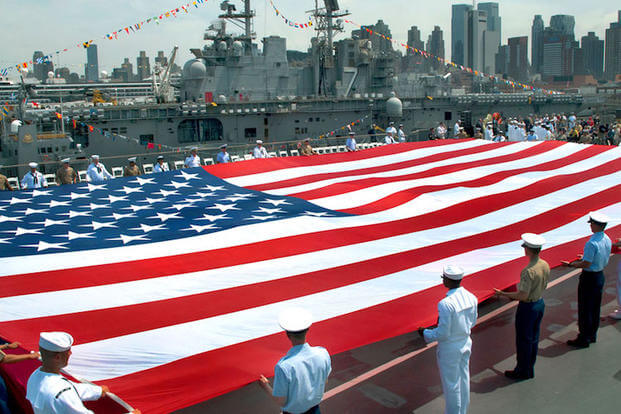Courage. It’s one of those noble qualities we all want. But what is courage? What traits do courageous people share? Is courage something that can be learned?
During the course of researching and writing my book, Valor: Unsung Heroes from Iraq, Afghanistan, and the Home Front, I was fortunate to interview a number of soldiers, sailors, and Marines who epitomize courage. Each of the heroes profiled in Valor endured a harrowing experience, in which they demonstrated remarkable bravery in the face of overwhelming odds.
Spending time with such courageous men was inspiring, and it made for some pretty exciting story-telling. It was also instructive. While I never served in the military and don’t expect to be dodging incoming rounds anytime soon, I nevertheless learned important lessons about courage.

Lesson #1: Courage Comes from Dedication to Something Greater
All the heroes I interviewed in Valor were motivated something greater than themselves. They all love their country, but it wasn’t just patriotism. To a man, each spoke of the special brotherhood that forms between people who serve together. That bond is unlike anything I have ever seen. They would do anything to help each other.
This sense of brotherhood was drilled into them from the beginning of their military service. One of the heroes – an enlisted Marine named James Hassell – described how their basic training forged this profound bond among his team. The countless drills and exercises shifted their focus from themselves as individuals to the team. “We had to watch out for our brothers – the other recruits. You can’t just worry about yourself. You have to become the same person, and you have to do everything as one. When everyone is working as a team, you don’t want to be the guy that causes everyone to do extra push-ups. You start thinking about everyone, and not just yourself.”
Amidst that backdrop, the worst affront a drill instructor could say was: “You are going to be one of those Marines that gets someone else killed.” That would rattle Hassell and the other young recruits. “They wouldn’t scare us with getting ourselves killed because, after a while, we didn’t really fear that. What we feared was letting down our brothers. We didn’t want to be the guy that gets one of your brothers killed…. I can live with mistakes in Iraq, but I couldn’t live with being the reason another Marine was killed. I could never face his parents or family.”
James Hassell, like all of the heroes, was dedicated to his brothers in arms – committed to the point of risking his life for them. In fact, James did just that when a teammate – a Marine named Ryan – was grievously wounded in a firefight in Najaf, Iraq. James volunteered to carry Ryan on his back through close-range insurgent fire to the medievac helicopter waiting 100 yards away. Hassell understood the dangers involved. He knew it was a long run, roughly the length of a football field down a narrow alley. And he knew that they would present a large, slow-moving target for the snipers sitting at point-blank range.
But his focus was not on himself – it was on his injured comrade. “I was more scared that I would make a mistake and get him killed. At that point, I am fully committed – I am committed to taking him out, committed to doing whatever it takes, to do whatever I can to save his life,” James told me. “I didn’t know if what I was doing was going to save his life, but I wanted to give him a chance.”
James did just that – he carried Ryan down that alley through the onslaught of fire and got him to the awaiting helicopter. Ryan is alive today because of James Hassell.
According to James, it was his dedication to his teammates that drove him to extraordinary action. “I knew our chances weren’t good: there was a good chance that we were going to die,” he told me. “That’s what I thought.” What he knew, however, was that if he did not do it, Ryan would definitely die. “I had a choice: either you can stay here and watch him die and you’ll probably live,” he said and then immediately cut himself off before finishing the thought, “but would I even want to live if I could just sit here and watch another Marine die without even trying? What kind of life would I have?”
We civilians won’t have to carry a wounded colleague through close-range enemy fire any time soon, but we can learn from James and the other heroes’ dedication to each other. The lesson is that we are at our best when we care passionately about what we are doing. That is the foundation for courage.
It doesn’t matter what it is – writing fiction, training for mixed martial arts, leading a Boy Scout troop, creating music or art, or raising money for children’s cancer research. What does matter, I learned, is the depth of your commitment.

Lesson #2: Courage is Found in Perseverance
Several of the heroes I profiled in Valor didn’t face just one moment of truth. They exhibited courage time and again, through the worst of circumstances. Most believed they were going to die at some point during the incidents recounted in the book.
But they did not stop. They persevered.
One of those heroes was an Army infantry grunt named Steve Sanford. On November 19, 2005, Steve’s unit was in a nasty firefight in Mosul, Iraq. After seeing his buddy Chris suffer a devastating injury from a sniper, Steve leapt directly into the line of fire, jumped on top of Chris, and started performing CPR. Steve was desperately trying to save Chris’s life, all while the sniper pinged away at Steve at close range over and over and over.
Steve knew he was getting shot, but he told me that didn’t matter: “I had better things to do than worry about pieces of metal sticking out of my vest.”
That is perseverance.
So what’s the lesson for us?
I have found that, when I’m ready to give up on something, I actually think about Steve Sanford giving CPR to his buddy Chris as the sniper poured bullets into his vest. That usually stiffens my spine – whatever obstacles stand in my way suddenly don’t seem so daunting.
So I would encourage anyone: the next time you are ready to give up on some task – to throw in the towel because the obstacles appear too difficult to overcome –conjure an image in your mind of Steve Sanford as he desperately provided CPR to his friend Chris and the bullets sticking out from his Kevlar vest. Let Steve’s perseverance give you courage to overcome the obstacles in your way.
![]()
Lesson #3: Courage Doesn’t Need Recognition
All of the heroes that I profiled in Valor – despite their medals and commendations – insisted that they were not heroes at all. All of them insisted that they just happened to be in the right place at the right time. All of them insisted that they did what everyone else would have done. All of them deflected credit, pointed to the actions of a colleague, minimized the dangers they faced, and downplayed the bravery of their actions.
In fact, they usually scoffed at their medals. I had the privilege of interviewing Navy SEAL Chris Kyle while he was still in the service, years before American Sniper. Although unknown to the American public at that time, Chris already was highly decorated and notorious among the insurgents and Navy SEALs alike. He had earned multiple Bronze Star medals and Silver Star medals for his valor in combat.
But the medals and awards mean nothing to him. Chris told me: “If I did this for awards, I woulda been outta here a long time ago.”
Another of the heroes, a retired Marine Corps master sergeant named Buck Doyle, echoed that sentiment. Buck earned a Bronze Star with Valor for braving direct sniper fire trying to save his injured friend Sgt. Nick Walsh, but he bristled at his medal and the idea of honors and commendations in general. “I don’t really think about awards at all,” Buck told me. “You do your job, and if you have the opportunity to go above and beyond your duties, then that’s the reward in itself.”
Buck, like all of the heroes, was motivated by his love for his fellow troops. “The award for me is the brotherhood. If you are accepted in that brotherhood, that’s the greatest award you can receive. For me, my award is having Nick’s parents regard me as part of their family – that’s a huge award. Hearing the story that Nick spoke of me the whole time to his parents, that he regarded me as a brother. That is the eternal reward that no colonel can think about giving me, so I regard that responsibility and honor of serving with those guys as the award.”
From these men, I learned that courage – true courage – doesn’t come from a desire for personal recognition. It was their team mentality that motivated these men to do extraordinary things.
The culture of humility among the men in Valor was refreshing – especially for someone who grew up in the Washington, D.C. area, where the local currency is claiming credit for things you didn’t do.
So how does that humility translate to our civilian world? Like the military culture I observed, try sharing credit with others and shining a light on other people’s successes. Tell others that someone else had a great idea. When someone works especially hard, send their manager an email touting their efforts. Simple steps like those have a powerful salutary effect on other people and give them courage to achieve more than they ever thought.
In fact, sharing credit highly contagious. Once people see that sharing credit will be reciprocated, they catch the bug too. It’s the opposite of a vicious cycle downward – it’s a virtuous cycle upward, one that will bolster your own courage too.
---------------
I learned so much more. Courage has nothing to do with rank. Courage comes from training. Courage is poise under fire.
As we observe Veterans’ Day this month, there is no better time to salute our troops, but also to learn from them.
Mark Lee Greenblatt is the author of Valor: Unsung Heroes from Iraq, Afghanistan, and the Home Front, (Taylor Trade, 2014), which is available on Amazon and at Barnes & Noble and independent bookstores across the country. Mark has been appeared on NBC, CBS, MSNBC, Fox News Radio, CSPAN-Book TV, Wall Street Journal TV, Forbes.com, and dozens of other media outlets. Visit Mark’s website at http://markleegreenblatt.com/ to learn more about the heroes in Valor or to send them an email.





